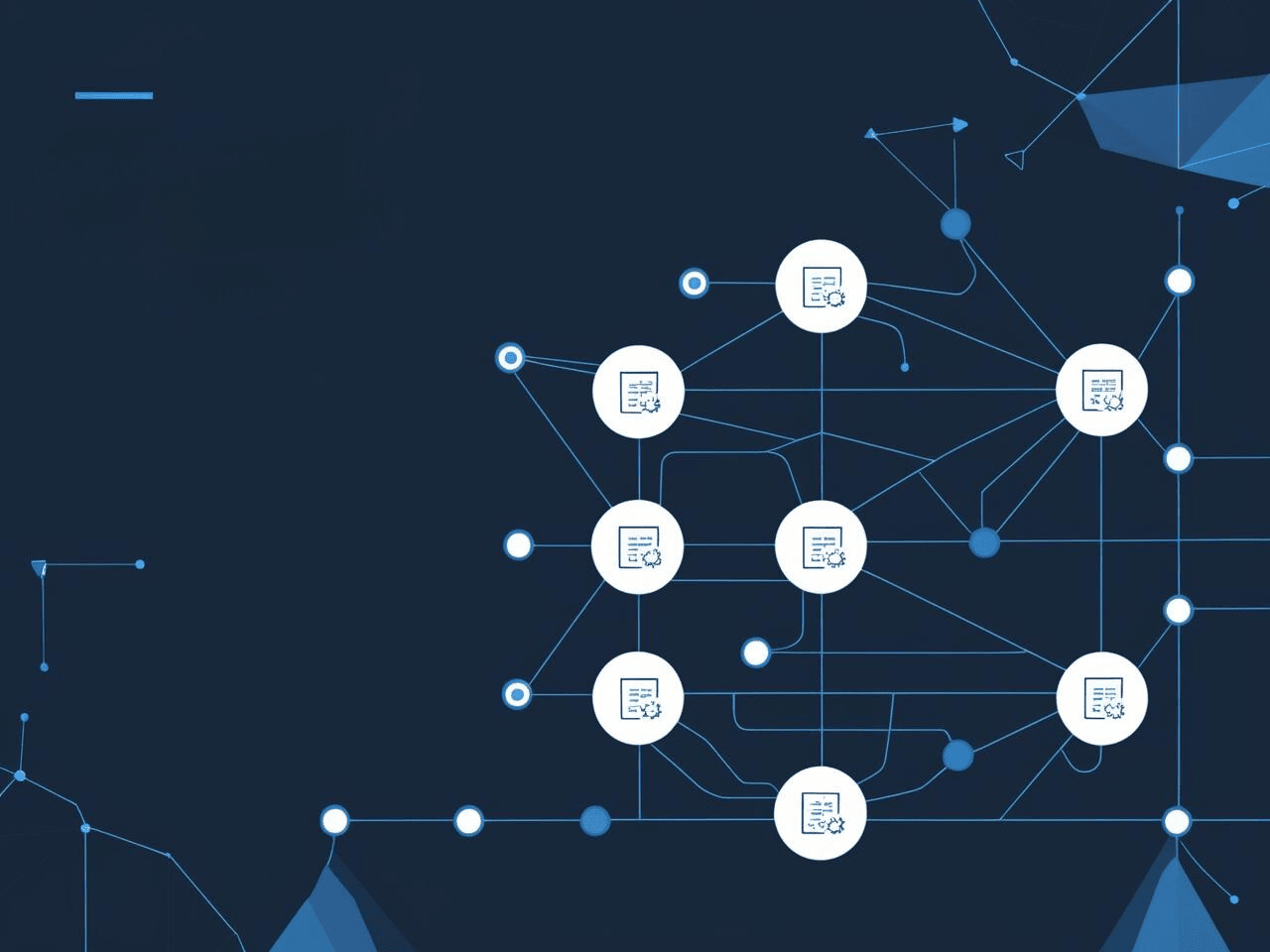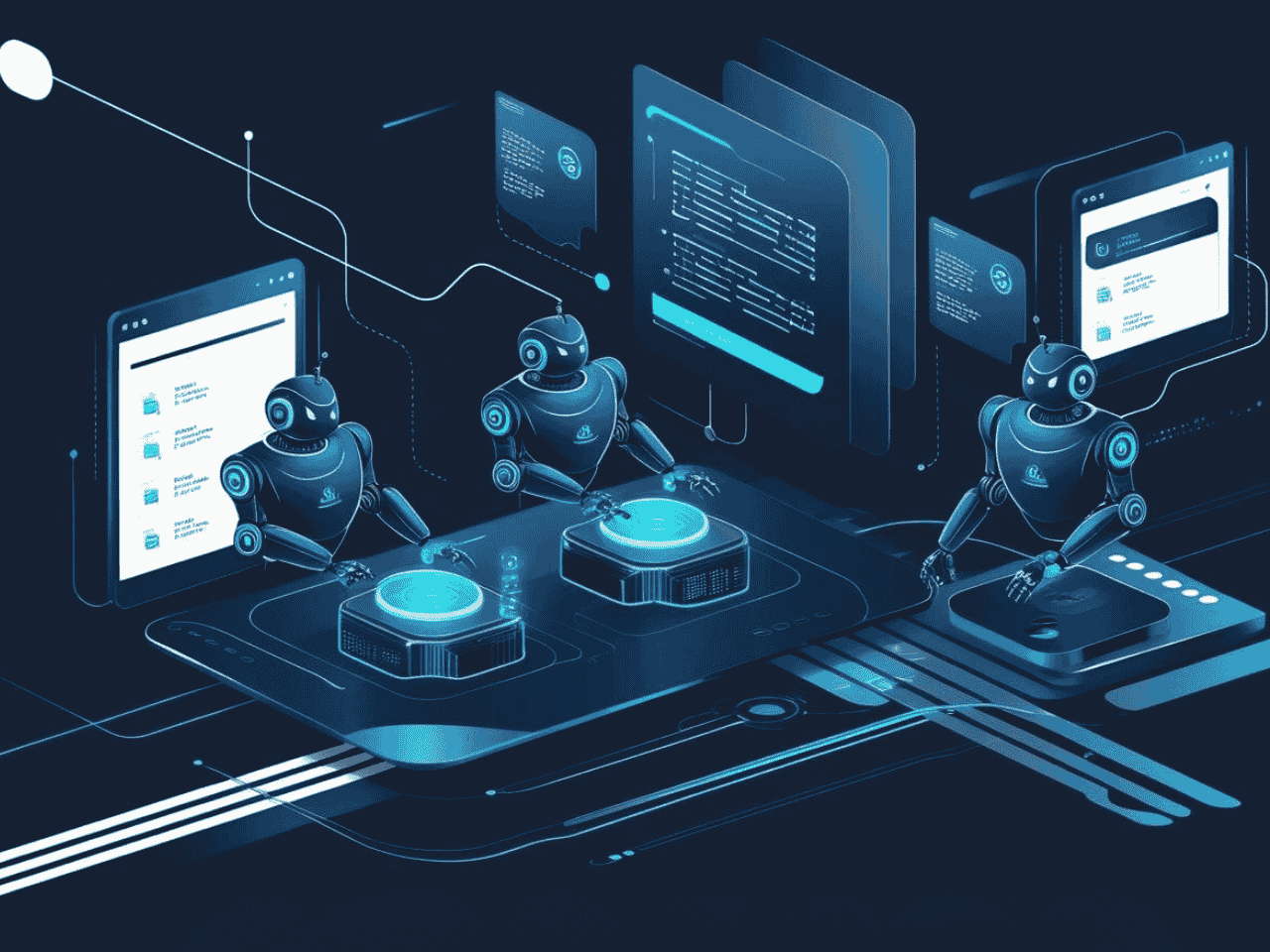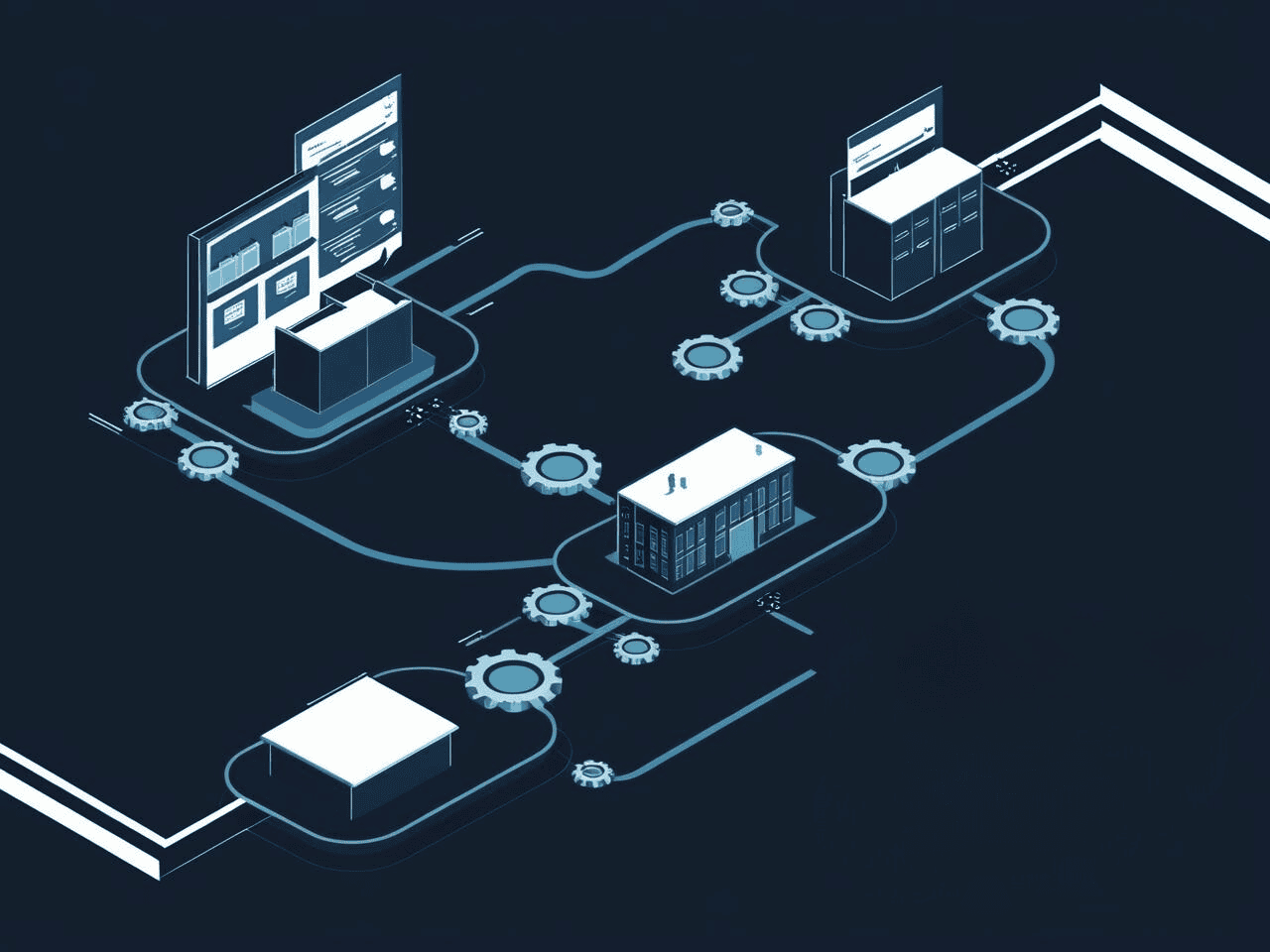What Solutions Do We Offer?
Basic Enterprise Automation

![]() Retail & E-commerce:
Implement automated restocking alerts and monthly sales performance reports to optimize inventory levels and monitor sales metrics without the need for manual tracking.
Retail & E-commerce:
Implement automated restocking alerts and monthly sales performance reports to optimize inventory levels and monitor sales metrics without the need for manual tracking.
![]() Healthcare:
Utilize automated appointment reminders and email confirmations to reduce missed appointments, enhance patient satisfaction, and enable administrative staff to focus on providing in-person support.
Healthcare:
Utilize automated appointment reminders and email confirmations to reduce missed appointments, enhance patient satisfaction, and enable administrative staff to focus on providing in-person support.
![]() Finance:
Schedule regular financial reports and automated transaction alerts to gain real-time insights into cash flow, ensuring finance teams maintain accurate records.
Finance:
Schedule regular financial reports and automated transaction alerts to gain real-time insights into cash flow, ensuring finance teams maintain accurate records.
![]() Manufacturing:
Set up maintenance reminders and automated equipment health checks to prevent unexpected downtime by facilitating regular inspections.
Manufacturing:
Set up maintenance reminders and automated equipment health checks to prevent unexpected downtime by facilitating regular inspections.
![]() Education:
Auto-generate enrollment confirmations and assignment reminders to keep students and staff informed and engaged throughout the academic year.
Education:
Auto-generate enrollment confirmations and assignment reminders to keep students and staff informed and engaged throughout the academic year.
![]() Hospitality:
Use booking confirmations and loyalty program notifications to enhance the guest experience by delivering timely information without requiring manual intervention.
Hospitality:
Use booking confirmations and loyalty program notifications to enhance the guest experience by delivering timely information without requiring manual intervention.
Rule-Based Automation

![]() Retail & E-commerce:
Implement discount codes automatically based on cart value, customer type, or product category, thereby increasing conversion rates and enhancing the overall customer experience.
Retail & E-commerce:
Implement discount codes automatically based on cart value, customer type, or product category, thereby increasing conversion rates and enhancing the overall customer experience.
![]() Healthcare:
Automatically categorize patient inquiries by urgency or department to ensure critical cases are prioritized and assigned to the appropriate medical staff.
Healthcare:
Automatically categorize patient inquiries by urgency or department to ensure critical cases are prioritized and assigned to the appropriate medical staff.
![]() Finance:
Utilize predefined rules to categorize transactions, facilitating faster reconciliation and improving accuracy in financial records.
Finance:
Utilize predefined rules to categorize transactions, facilitating faster reconciliation and improving accuracy in financial records.
![]() Manufacturing:
Route maintenance requests to technicians based on equipment type, urgency, and availability, which enhances response times and maintenance efficiency.
Manufacturing:
Route maintenance requests to technicians based on equipment type, urgency, and availability, which enhances response times and maintenance efficiency.
![]() Education:
Filter and direct student inquiries based on academic programs or topics, ensuring they reach the appropriate departments or advisors for quicker responses.
Education:
Filter and direct student inquiries based on academic programs or topics, ensuring they reach the appropriate departments or advisors for quicker responses.
![]() Hospitality:
Personalize guest offers using previous stay history or preferences, ensuring a tailored experience for repeat customers.
Hospitality:
Personalize guest offers using previous stay history or preferences, ensuring a tailored experience for repeat customers.
Robotic Process Automation (RPA)

![]() Retail & E-commerce:
Implement RPA to extract order details from customer emails and automatically enter them into order management systems, thereby reducing manual processing time and improving order accuracy.
Retail & E-commerce:
Implement RPA to extract order details from customer emails and automatically enter them into order management systems, thereby reducing manual processing time and improving order accuracy.
![]() Healthcare:
Utilize bots to automatically extract patient data from intake forms and input it into electronic health records (EHR), enhancing data accuracy and significantly reducing data entry time.
Healthcare:
Utilize bots to automatically extract patient data from intake forms and input it into electronic health records (EHR), enhancing data accuracy and significantly reducing data entry time.
![]() Finance:
Deploy RPA bots to process invoices, categorize expenses, and update accounting records, streamlining bookkeeping and financial operations for greater efficiency.
Finance:
Deploy RPA bots to process invoices, categorize expenses, and update accounting records, streamlining bookkeeping and financial operations for greater efficiency.
![]() Manufacturing:
Automate the capture of data from sensors on the production line, logging critical information for quality control and inventory management without human intervention.
Manufacturing:
Automate the capture of data from sensors on the production line, logging critical information for quality control and inventory management without human intervention.
![]() Education:
Use RPA to process student applications and update academic records efficiently, enabling institutions to manage large volumes of student data with ease.
Education:
Use RPA to process student applications and update academic records efficiently, enabling institutions to manage large volumes of student data with ease.
![]() Hospitality:
RPA can automate guest check-ins, update room availability in real-time, and process guest feedback forms, thereby improving operational efficiency and enhancing the guest experience.
Hospitality:
RPA can automate guest check-ins, update room availability in real-time, and process guest feedback forms, thereby improving operational efficiency and enhancing the guest experience.
Business Process Automation (BPA)

![]() Retail & E-commerce:
Automate the complete order-to-fulfillment process, from order receipt and verification to shipping and invoicing, ensuring a seamless experience for customers and reducing the potential for errors.
Retail & E-commerce:
Automate the complete order-to-fulfillment process, from order receipt and verification to shipping and invoicing, ensuring a seamless experience for customers and reducing the potential for errors.
![]() Healthcare:
BPA can streamline the patient intake process by automating appointment scheduling, medical history collection, and insurance verification, which enhances patient care while significantly reducing the administrative workload.
Healthcare:
BPA can streamline the patient intake process by automating appointment scheduling, medical history collection, and insurance verification, which enhances patient care while significantly reducing the administrative workload.
![]() Finance:
Improve the loan application process by automating each stage—from submission and verification to approval and disbursement—thereby reducing turnaround times and enhancing customer satisfaction.
Finance:
Improve the loan application process by automating each stage—from submission and verification to approval and disbursement—thereby reducing turnaround times and enhancing customer satisfaction.
![]() Manufacturing:
Automate the supply chain management process, including order tracking, inventory management, and supplier coordination, to minimize lead times and optimize resource allocation effectively.
Manufacturing:
Automate the supply chain management process, including order tracking, inventory management, and supplier coordination, to minimize lead times and optimize resource allocation effectively.
![]() Education:
Streamline student onboarding, course registration, and grading processes through automation, ensuring efficient academic operations while reducing manual data handling.
Education:
Streamline student onboarding, course registration, and grading processes through automation, ensuring efficient academic operations while reducing manual data handling.
![]() Hospitality:
BPA can manage guest reservations, service requests, and check-out processes from start to finish, ensuring a smooth and enjoyable experience for guests.
Hospitality:
BPA can manage guest reservations, service requests, and check-out processes from start to finish, ensuring a smooth and enjoyable experience for guests.
Integration Automation

![]() Retail & E-commerce:
Integrate inventory management systems with CRM and e-commerce platforms to ensure accurate product availability and streamline order processing, leading to improved customer satisfaction.
Retail & E-commerce:
Integrate inventory management systems with CRM and e-commerce platforms to ensure accurate product availability and streamline order processing, leading to improved customer satisfaction.
![]() Healthcare:
Synchronize patient data between electronic health records (EHR) and billing systems to reduce discrepancies and enhance coordination in patient care, ultimately improving patient outcomes.
Healthcare:
Synchronize patient data between electronic health records (EHR) and billing systems to reduce discrepancies and enhance coordination in patient care, ultimately improving patient outcomes.
![]() Finance:
Sync CRM data with financial software for seamless billing and payment processing, enabling accurate reporting and enhancing overall financial management.
Finance:
Sync CRM data with financial software for seamless billing and payment processing, enabling accurate reporting and enhancing overall financial management.
![]() Manufacturing:
Integrate ERP systems with inventory and production systems to provide real-time insights into supply levels and production capacity, optimizing resource allocation.
Manufacturing:
Integrate ERP systems with inventory and production systems to provide real-time insights into supply levels and production capacity, optimizing resource allocation.
![]() Education:
Connect student information systems with learning management systems (LMS) to ensure that grades, attendance, and academic records are up-to-date and easily accessible for both staff and students.
Education:
Connect student information systems with learning management systems (LMS) to ensure that grades, attendance, and academic records are up-to-date and easily accessible for both staff and students.
![]() Hospitality:
Integrate booking systems with CRM and property management systems to create a unified view of guest information, ensuring a seamless experience across departments.
Hospitality:
Integrate booking systems with CRM and property management systems to create a unified view of guest information, ensuring a seamless experience across departments.
Intelligent Automation

![]() Retail & E-commerce:
Utilize AI-driven demand forecasting to predict inventory needs based on sales trends, enabling more accurate stock management and minimizing holding costs.
Retail & E-commerce:
Utilize AI-driven demand forecasting to predict inventory needs based on sales trends, enabling more accurate stock management and minimizing holding costs.
![]() Healthcare:
Leverage historical data to predict patient needs, allowing for proactive patient care and preventive treatments that enhance overall patient outcomes.
Healthcare:
Leverage historical data to predict patient needs, allowing for proactive patient care and preventive treatments that enhance overall patient outcomes.
![]() Finance:
Implement machine learning algorithms to detect anomalies in transactions, thereby reducing fraud risk and ensuring compliance with regulatory standards.
Finance:
Implement machine learning algorithms to detect anomalies in transactions, thereby reducing fraud risk and ensuring compliance with regulatory standards.
![]() Manufacturing:
Employ predictive maintenance systems to anticipate equipment breakdowns and schedule maintenance before issues arise, effectively reducing downtime and optimizing production processes.
Manufacturing:
Employ predictive maintenance systems to anticipate equipment breakdowns and schedule maintenance before issues arise, effectively reducing downtime and optimizing production processes.
![]() Education:
Use AI to personalize learning paths for students by analyzing performance data and suggesting tailored content and resources, ultimately improving learning outcomes.
Education:
Use AI to personalize learning paths for students by analyzing performance data and suggesting tailored content and resources, ultimately improving learning outcomes.
![]() Hospitality:
Analyze past behavior, preferences, and feedback using AI to personalize guest experiences, thereby enhancing guest satisfaction and fostering loyalty.
Hospitality:
Analyze past behavior, preferences, and feedback using AI to personalize guest experiences, thereby enhancing guest satisfaction and fostering loyalty.
